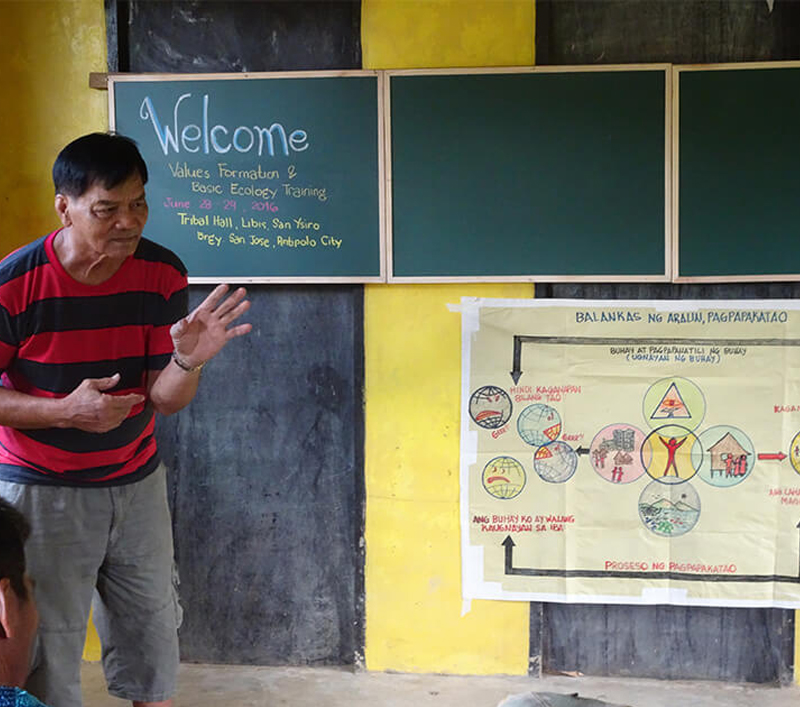Community empowerment and collaboration are principles that CCIPH consistently embody in every biodiversity conservation and rehabilitation initiatives.
A testament of these thrusts is the Facilitating and Organizing Rehabilitation and Ecosystem Stability Through Family-Based Approaches or FOREST Families. FOREST Families, an off-shoot of the Marikina Watershed Initiative (MWI), was conceptualized to address the community-based rehabilitation component of MWI. It aims to address the twin issues of poverty and environmental degradation surrounding the Marikina Watershed by implementing a sustainable family-based rehabilitation program – focusing on improving community income and restoring watershed resources.
CCIPH worked on ensuring poverty alleviation by sustaining family-based watershed resource management efforts in the Marikina Watershed. The organization also focused on community organizing, legal, technical, financial, managerial, research, monitoring, and documentation capacity-building needs for the rehabilitation of the watershed. Initiatives under FOREST Families were implemented by working hand-in-hand with the families and the local government unit. FOREST Families was composed of five phases:
- Phase 1: Establishment of Ecological Baseline to determine mitigating measures for the impacts of climate change (extreme weather conditions) to the communities and the natural ecosystems they depend on. CCIPH established ecological baselines as basis for management planning using historical, secondary and primary information of key habitats such as forest ecosystem, habitat and vegetation types in the area, and identify the natural and anthropogenic factors that influence flora/faunal richness and abundance and endangerment of species.
- Phase 2: Community–based identification workshops for priority restoration site within the Marikina Watershed. The workshops identified priority restoration sites within the barangay intercepted by the watershed. Results of the surveys and mitigating measures were shared to the local government units, which became the be the basis for the institutionalization of the restoration site.
- Phase 3: Institutionalization of priority restoration site within the watershed. The institutionalization of the site was accomplished through public consultation, drafting of barangay resolution, and the drafting of restoration site legal basis.
- Phase 4: Establishment and institutionalization of a family-base restoration program. The establishment of family-based program is aimed at sustaining the restoration site by strategically building a family-based alliance supported by the local government units within the watershed. The process involved the following: (1) barangay consultation on the selected families for the restoration program, (2) establishment of family-based wildlings nursery, (3) establishment of family plots, (4) drafting of a family-local government memorandum of agreement regarding the planting (rehabilitation) and maintenance of the family plots for five years, and the (5) planting proper.
- Phase 5: Monitoring and Evaluation. The project is evaluated and monitored yearly.
Embodying the spirit of community partnership and collaboration, the organization was able to gain support from Smart Communications, through their Public Affairs team. This partnership allowed the reforestation of portions of a five (5) hectares idle land in Sitio Libis, Purok San Ysiro, Brgy. San Jose in Antipolo City. The area is adjacent to the community’s water source which was the main factor considered in determining the location of area to be reforested.
Three tree planting activities were conducted with three groups of employees from Smart: the mountaineering group with 20 members, the group of engineers with nine members, and the Voyager group with 21 members – all of which were assisted by FOREST Family members. SMART employees were able to plant to 1,008 seedlings in total. Based on the seedling inventory made by the community, the group planted native species of trees such as banuyo (Wallaceodendron celebicum), narra (Pterocarpus indicus, saliksik, tua, sampaloc (Tamarindus indica), langka (Artocarpus heterophyllus), kasoy (Anacardium occidentale), tibig (Ficus nota), hawili (Aleurites moluccanus), and dungon (Heriteira sylvatice), among others.
The planted seedlings are fruit-bearing trees and hardwood or regular trees. The seedlings planted were provided by the families brought from them at Php 12.00 per seedling. As their shared effort in the reforestation program of the project, the FOREST Family members assisted the partners in terms of boring holes on the ground, transport of seedlings to the site, and providing sticks for the marker, among others.
For the main livelihood component of the program, farmers who are also part of the FOREST Families initiative partnered with Good Food Community in engaging a potential local market. With the help of Good Food Community, the potential local market aims to assess the capacity and capability of local organic farmers to supply market demand. This will potentially uplift their economic activities and expand outside their usual market sites.
CCIPH believes that community empowerment is essential in the success and sustainability of any conservation and rehabilitation initiatives. Indeed, it is critical to saving what is left of the environment – but this should also entail the improvement of the quality of life of the community striving in it. After all, it is the community that will be the ultimate steward of their respective environment.

